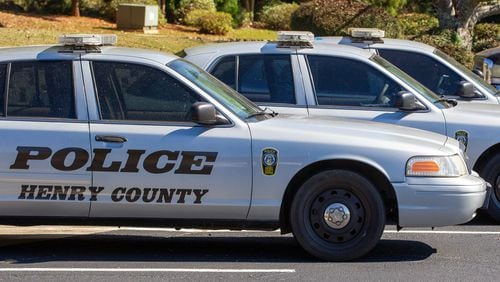After more than two decades of service, Henry County wants to retire the 1999 Crown Victoria models it still has in its fleet of police cruisers.
There’s just one problem: The pandemic has caused a global shortage of computer chips and other parts necessary to power today’s cop cars.
“Our vehicles are very, very old,” Henry County Financial Services Director David Smith said of the Ford vehicles that were synonymous with police agencies for decades, but stopped production in 2013. Henry has about 200 vehicles in service that were purchased between 1999 and 2012, the county said.
“We’ve been working to replace all those old vehicles, not just for our police department but for our sheriff’s office as well,” Smith said. “They are way past their life span.”
Metro Atlanta public safety officials say the vehicle and parts shortfall, which extends to ambulances, fire trucks and motorcycles, is putting outsized pressure on a sector already stressed by fewer patrol officers because of labor shortages, increasing crime and more emergency calls due to COVID-19.
Cobb County is waiting on hose couplings for fire trucks; DeKalb County doesn’t know when the 153 Chevrolet Tahoes ordered last month will arrive.
Gwinnett officials, who said the county does not have any outstanding need for police cars, said vehicles for other departments such as maintenance and mail are taking longer to receive than usual.
The result could lead to more equipment failures and cars in the maintenance garage at a time when metro residents are counting on emergency personnel the most, experts said.
“You need a car that is dependable,” said Thaddeus Johnson, a former police officer and assistant professor in Georgia State University’s Department of Criminal Justices and Criminology. “You don’t want to have a car that breaks down on you when you’re in route to a call.
“You don’t want to have to be towed when someone’s calling 911.”
Safety first
The departments are quick to insist that, despite the issues, neither the welfare of public safety officers nor the community is in jeopardy.
Department leaders have prioritized vehicles and equipment so that the newest supplies available are matched to areas where they are most needed, officials say.
Older cars also are often used more for training or in non-emergency circumstances, according to public safety officials.
Still, county leaders characterized the supply disruptions as either critical or concerning.
Cobb, for instance, is on a three- to six-month waiting lists for fire truck ladders while DeKalb received an order of Chevrolet Tahoes five months later than expected.
Some officers in Clayton are sharing police cruisers because the county is still waiting on orders to be filled, said Clayton Chief Operating Officer Detrick Stanford said.
“We used to have a single police officer assigned to a vehicle, now we have to double up,” he said.
The problem has become so bad that departments are starting to band together on orders, in hopes of jumping to the front of the line.
Cobb County, for instance, met recently with Nashville Police officials to discuss an order the Tennessee department had already put in for Toyota Camrys. Cobb has enough cars for its police emergency use, but is trying to get vehicles for police administrative staffs, a county spokesman said.
“They have been trying to replace several dozen administrative vehicles with Chevy Malibus,” Cobb spokesman Ross Cavitt wrote in an email. “However, they’ve been told those vehicles may not be available for delivery until 2023.”
Stockbridge city procurement director Lindell Miller said she, too, is open to partnerships.
Miller said she uses every possible resource to attain vehicles, including employing the National Institute of Government Procurement and working with cooperatives that purchase cars in volume.
“I reach out to government entities in California, in Florida and to the north of us to find out what they are experiencing,” she said. “If I can piggyback a contract with them or find out what they are doing, I use that strategy.”
Short life span
To be sure, the issue is not new.
Public safety officials across the metro area, from Clayton to Cobb, have complained for years about sirens that don’t work, and cars with high mileage or faulty breaks.
The pandemic, however, has exacerbated those problems by extending waits from just over a couple of months to half a year or more, the county officials said.
“Generally when we order vehicles, depending on the time of year, we’d see delivery times of three to four months,” said Rob Adderley, director of Gwinnett County’s Fleet Management Division. “Now we’re seeing things in excess six months for delivery.”
Police cars are typically the most difficult to procure because they have a shorter shelf life, the leaders said. Most departments say cruisers should not be used beyond 125,000 miles because of how hard they are driven.
Johnson, the Georgia State professor, said using current vehicles is important in another way — as a marketing tool. The public is more likely to respond to sleek, shiny police cars than older cruisers that hail from a bygone era.
“The image is so important and we often loose sight of that,” he said.
For Henry, the focus is less on showy cars and more on catching up.
“We’ve been hiring additional officers in both the police department and the sheriff’s office,” Henry’s financial services chief Smith said. “As we bring those officers on board, they need vehicles.”
About the Author






